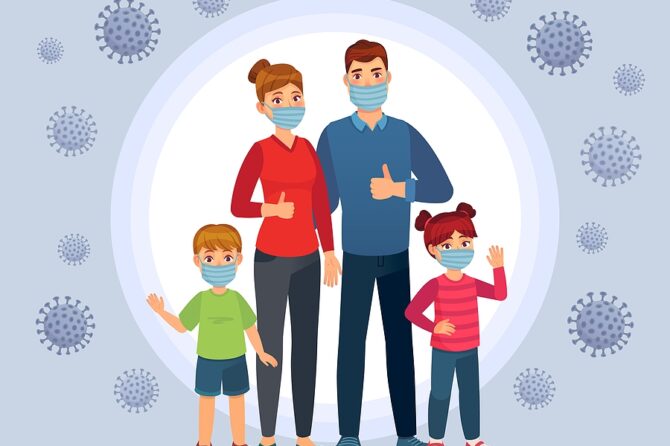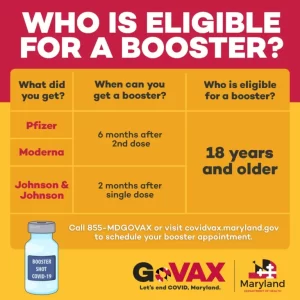
Updated Guidance on Vaccines and Boosters
By: Joseph Mechak, MD with Emily Atwood, MD
Pfizer COVID-19 Vaccine for children 5-11 years old
On November 2nd, 2021 the CDC and FDA granted Emergency Use Authorization for the 2-dose Pfizer COVID vaccine for all children aged 5-11 years old. Dr. Atwood and I hosted a Facebook live about why the FDA, CDC, and all of us at Potomac Pediatrics recommend that your child be vaccinated. You can check out the 25 minute session via the link here (https://fb.watch/9DjXBHQ6UD/) or I have distilled a few of the high points here:
What are the risks of Pfizer COVID-19 vaccine in the 5-11 year old age group:
Vaccine side effects were very similar to those seen in adults. They fall into three major categories:
- Systemic side effects – This includes things like fever, fatigue, chills, headache, muscle pain, etc. These side effects were present, but less frequent in the 5-11 year age group compared with older teens and adults. For example, fever was found in about 18% of teens/adults and only 7% of 5-11 year olds. Headache was present in 61% of teens/adults and only 28% of the younger age group. The systemic side effects were short lived, typically lasting 1-2 days.
- Localized side effects – This includes arm soreness, redness, and pain at the injection side. These side effects were also present in all age groups, but were found in a slightly higher rate in the 5-11 year old age group. About 18% of 5-11 year olds had redness at the injection site compared with only 6% of adults. Similarly swelling was slightly more common; 15% of 5-11 year olds vs 7% of teens/adults. Self-report pain was similar in the age groups.
- Serious Adverse Events (SAE) – This category is fairly broad and includes things like severe allergic reaction, Bell’s palsy, myocarditis (more on this below), death, and others. Obviously these are the most important type of side effects to monitor. Importantly, there were zero SAEs in the >4500 children enrolled in the trial. These types of reactions are also closely monitored by the Vaccine Adverse Effects Reporting System (VAERS), from which we have learned that these types of events are very rare in the older children and adults.
- Myocarditis – Myocarditis or an inflammation of the heart muscle was included under the SAE category but deserves its own discussion. There have been hundreds of cases of myocarditis linked to the Pfizer vaccine out of the 280+ million doses that have been administered. These cases were almost exclusively found in older teen and young adult males. Almost all cases of these cases of vaccine-associated myocarditis were mild and self limited. On the other hand, Myocarditis is found at a much higher rate with COVID-19 disease and these cases of COVID-associated myocarditis are much more severe. The CDC, FDA, and the Pfizer team specifically and very carefully monitored for myocarditis in the 5-11 year old study group and zero cases were identified. This side effect was discussed at length during the FDA and CDC hearings where, again, both groups ultimately voted unanimously to approve the EUA because they felt the benefits of the vaccine outweighed all of the risks, myocarditis included. These groups will continue watching closely for any cases during the vaccine roll out but are optimistic that there will be far fewer cases in this younger age group (more on why on the Facebook Live Video).
What are the benefits of the vaccine
- The vaccine was found to be 90.7% effective at preventing COVID disease.
- Based on extrapolation from adult data and risk modeling, the vaccine is also expected to significantly reduce disease severity, risk of hospitalization, and risk of death in the vaccinated pediatric population.
- To date, COVID has been responsible for >8300 hospitalizations, >2500 ICU admissions, and >94 deaths in the 5-11 year old age group. The vaccine will protect your child from adding to this count.
- Vaccinating school aged children will help limit spread to more vulnerable people in the home.
- We hope that the added protection from the vaccine is a big step in reducing missed school days from exposure/illness and help our children get back to a more normal life.
Does the vaccine work against variants
The Pfizer trial did not look specifically at the effectiveness of the vaccine against different variants. However, the study was performed in the United States when the Delta variant accounted for 94% of the circulating coronavirus, so it does seem to work well against the highly contagious Delta variant. Scientists are urgently looking into effectiveness against the new Omicron variant.
Bottom line on vaccines in the 5-11 year old age group:
The CDC Advisor Panel voted 14-0 in favor of Emergency Use Authorization for the 5-11year age group. The FDA advisory panel voted 17-0 (with one abstention) in favor as well. The American Academy of Pediatrics and all of the providers at Potomac Pediatrics strongly recommend you get the COVID-19 vaccine for any child 5 years and older as the available data shows that it is both safe and effective at protecting your child from COVID.
Boosters: Who is eligible for what?
Frequent guideline changes and updates to CDC recommendations have created some confusion over booster shots. Over the past couple of weeks, however, the recommendations have gotten much more clear and concise.
Simply put, anyone over the age of 18 is eligible to get a booster shot – of any type – 6 months after an mRNA vaccine (Pfizer or Moderna) or 2 months after the Johnson & Johnson vaccine. The CDC has also recently strengthened their recommendation to state that all adults 18 years and older SHOULD get a booster rather than MAY get a booster shot. They feel that this is especially important in light of the new Omicron variant.
You will notice that this recommendation does NOT include 16-17 year olds, many of whom got their Pfizer vaccine at the same time as the adults. Pfizer is currently applying for EUA for these teenages to be eligible for booster shots just like the adults. This has not yet been given the green light, but is expected to be approved soon. We cannot administer any booster doses in the age group until approved – no exceptions.
There is no information available at this time (that I can find) about boosters for the 12 to 16 population.












Leave a reply